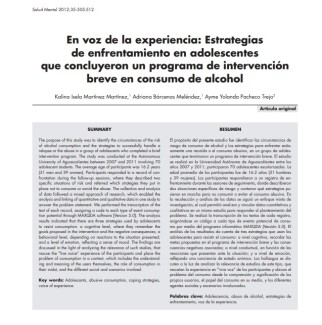Teen confrontation strategies that concluded a short intervention program in alcohol consumption

The purpose of this study was to identify the risk circumstances of alcohol consumption and strategies to successfully deal with relapse or abuse in a group of adolescents who completed a short intervention program. The study was conducted at the Universidad Autónoma de Aguascalientes between 2007 and 2011; 70 adolescents attended school. The average age of the participants was 16.2 years (31 men and 39 women). Participants responded to a confrontational record during the follow-up sessions, describing two specific risk situations and telling them what strategies they put in place to avoid consuming or avoiding abusive consumption. The collection and analysis of the data followed a mixed research approach, which allowed the analysis and linking of quantitative and qualitative data in the same study to respond to the problem approach. The texts of each record were transcribed, with a code assigned to each type of potential consumer event by means of the MAXQDA software (Version 5.0). The analysis of the results accounts for three strategies that adolescents use to resist consumption: at the cognitive level, remember the goals proposed in the short intervention program and the associated negative consequences; at the behavioral level, depending on the reactions they present to the situation; and at the level of emotion, reflecting an awareness of mood. The findings are discussed in the light of analyzing the relevance of studies of this type, which rescue the experience in "living voice" of the participants and locate the problem of consumption from the understanding and significance of the users themselves, the role of consumption in their midst , and the different social agents and scenarios involved.
